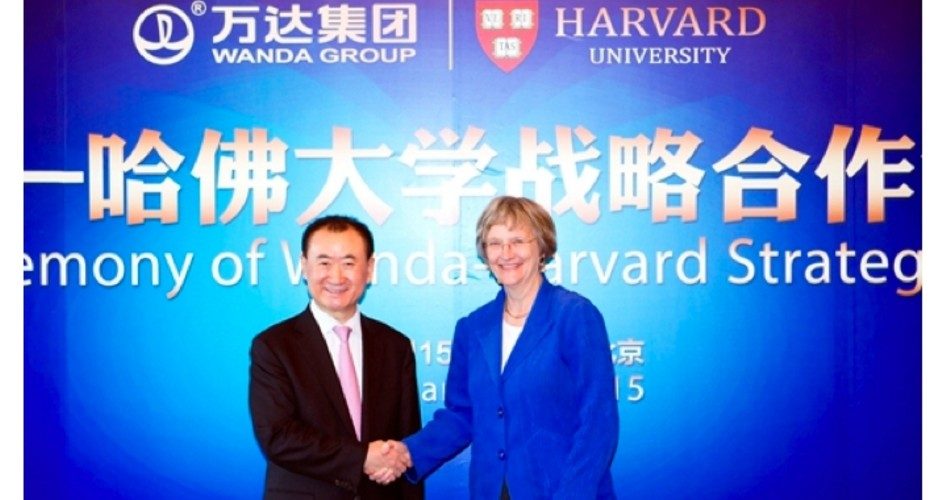
East Coast-West Coast, from Harvard to Hollywood, China Inc. is setting down a big footprint, with indispensable assistance from some of the biggest names on Wall Street: Goldman Sachs, Morgan Stanley, Carlyle Group, Kissinger Associates, CitiBank, JPMorgan Chase.
Wang Jianlin, “China’s richest billionaire” and chairman of the huge Wanda Group conglomerate is the current leading darling among China’s Communist Party elite being toasted by America’s and Europe’s globalist elites. As The New American recently reported (China Cash and Movie Moguls — The Disturbing New Hollywood-Beijing Axis), Wang Jianlin is leading Beijing’s multi-billion dollar “Chollywood” effort aimed at merging the China-U.S. film industries to create the dominant global entertainment-propaganda machine. That project is well on its way, with Wang’s $2.5 billion purchase in 2012 of AMC Theaters (making Wanda the world’s largest cinema operator), his $8.2 billion investment in a mammoth film studio/entertainment complex in Qingdao, and Wanda Group’s $3.5 billion buyout of Legendary Entertainment (producer of blockbusters Jurassic World, 300, the Batman/Dark Knight trilogy, Pacific Rim, Godzilla, and Man of Steel).
Harvard’s Faustian Bargain
From low-brow entertainment to high-brow academia, Wang is covering all the bases. In a September 6, 2015 press release, the Wanda Group proudly displayed a photograph (shown above) of Chairman Wang shaking hands with Harvard University President Catharine Drew Gilpin Faust. The photo marked the occasion of Wang’s induction as vice chairman of the university’s Global Advisory Council.
“Wang Jianlin, Chairman of Wanda Group, was invited to serve as the Vice Chair of Harvard University’s Global Advisory Council by Catharine Drew Gilpin Faust, the President of Harvard University,” the Wanda press release stated. “The Global Advisory Council is Harvard’s most authoritative advisory body,” it continued, “designed to offer advice and suggestions on the university’s global strategy. The council is comprised of leading individuals from various sectors and chaired by Co-Founder and Managing Director of the Carlyle Group, David Rubenstein. Harvard University is one of the most prestigious universities in the world and it is a great honor for Wang Jianlin to serve as Vice Chair of its Global Advisory Council.”
Typical of Chinese corporate PR pieces, Wang’s promoters at Wanda went heavy on the name dropping and puffery:
Wanda has also been active in top business and political circles. Wang Jianlin met with US President Barack Obama at the SelectUSA Investment Summit back in March and has also met with numerous heads of state such as UK Prime Minister David Cameron, French President Francois Hollande and Australian Prime Minister Tony Abbot among others. Furthermore, Mr. Wang has delivered keynote speeches at various world-renowned universities such as Harvard in the past. Harvard Business School has incorporated Wanda’s high-profile acquisitions of AMC Cinemas and Infront Sports & Media into its case studies.
Did Wang simply buy his way into the prestigious Harvard appointment? For many observers, that is an obvious affirmative. The following month, in October 2015, Harvard’s own media relations department announced the launch of a new Harvard Global Institute financed by Wang. “Harvard has long been an international institution, but a new University-wide effort hopes to create a globalization strategy as intentional as it is inherent,” said the Harvard press release. “Called the Harvard Global Institute (HGI), the effort was established at the recommendation of the International Strategy Working Group and the Faculty Advisory Committee on Global Institutes.”
“The launch of HGI was made possible through support from Wang Jianlin, chairman of the Beijing-based Wanda Group,” said the Harvard announcement. “Wang views this gift as a mutually beneficial collaboration between China and one of the world’s leading teaching and research institutions.”
Wang, whom Forbes magazine named “Asia’s Businessman of the Year in 2013,” is well connected in both the communist and capitalist worlds. “So confident are Beijing’s communist dictators of the willful blindness and ideological affinity of the Hollywood movie industry and the American press that they can hide their schemes in plain sight,” we noted in a previous posting on Wang.
“This can be seen, for instance, in Wang Jianlin’s official curriculum vitae for the World Economic Forum, the annual gathering of the super-rich and their tagalongs among the global glitterati, intelligentsia, and commentariat.” We pointed out that the WEF states Wang has served as “Deputy to the 17th National Congress, CPC [Communist Party of China]. Member, Standing Committee, CPPCC National Committee. Vice-Chairman, All China Federation of Industry and Commerce.” Nowhere do the words “Communist” or “Communist Party”, as such, appear in the WEF bio, but that is precisely what “CPC” and “CPPCC” refer to, of course.
The same can be said for many of the other Chinese “businessmen” who are regular attendees among the jet-set billionaires at the WEF confabs in Davos, Switzerland. Jack Ma, who vies with Wang for the title of China’s richest tycoon, plays it more coy than most; he is not openly a CPC member, but his loyalty and ties are apparent. Ma, the founder of e-commerce giant Alibaba (China’s version of Amazon and EBay — but many times bigger than both combined), for instance, reportedly told the South China Morning Post, in a 2013 interview, that the decision by Communist authorities to mow down protesters in Tiananmen Square in 1989 was the “correct” thing to do. That outrageous remark caused a temporary flare-up of indignation outside of China, but undoubtedly worked to his favor with Party leaders. A report by the Epoch Times last year entitled, “Richest in China are Connected with the Communist Party,” cites evidence that Ma and other top Chinese “capitalists” are actually servitors of the Communist Party, which should not be news to anyone but the most obdurate and willfully blind.
Nevertheless, Jack “Mow ‘em down” Ma is the darling of the globalist set. At the latest WEF gathering, Ma’s private dinner party featured A-List names of “the great and the good” from all spheres of power and influence. A Shanghai website featuring photos of the exclusive event reported: “Perhaps the belle of the ball was British Prime Minister David Cameron, who showed up in a blue-collared shirt with no tie, he was greeted by such international celebrities as Bono, Leonardo DiCaprio and Kevin Spacey,one of Alibaba’s biggest fans.”
“Though the party was not just attended by celebrities alone,” the report continues, “there were also some people with real power as well, including: Cisco CEO John Chambers, Coca-Cola CEO Muhtar Kent, U.S. Secretary of Commerce Penny Pritzker, JPMorgan Chase CEO Jamie Dimon, UPS CEO David P. Abney, former Australian Prime Minister Kevin Rudd, former UK Prime Minister Tony Blair and new Canadian Prime Minister Justin Trudeau….” A few months earlier, at the 2015 APEC summit in Manila, Ma enjoyed an even greater triumph, sharing center stage with President Barack Obama (photos here) in a duo performance that catapulted him to the top levels of the global business firmament.
CFR Game Plan
The stepped-up pace of China’s acquisitions of companies, real estate, and influence in the United States (see articles linked below) is being facilitated by Wall Street’s globalist titans. As we reported in 2013, the planned acceleration of convergence of the U.S.-Chinese economies was forecast (and set in motion by) “Policy Innovation Memorandum No. 13,” published by the New York-based Council on Foreign Relations (CFR) in 2012, under the title “Fostering Greater Chinese Investment in the United States.” The study was written by David M. Marchick, managing director of the Carlyle Group, the huge investment firm ($194 billion in assets under management) that has been one of the key bulls on both U.S. investement in China, and vice versa.
“Given the slow pace of the economic recovery, the United States would benefit hugely from additional FDI [Foreign Direct Investment],” Marchick claimed. “Critics argue that Chinese investment could compromise U.S. security interests and lead to job offshoring,” he continued. “While Chinese acquisition of certain U.S. companies in the defense or technology sectors would create national security concerns, the preponderance of potential Chinese investments in the United States would raise no such issues.”
Following up on the Marchick/Carlyle/CFR memo, Edward Alden (CFR) authored a blog on the CFR’s “Renewing America” web page entitled “Attracting Chinese Investment: Here’s Where to Start.” According to Alden: “The United States needs to start by making it clear that this country actively wants and will encourage Chinese investment, and by working with China to eliminate misperceptions and clear away unnecessary obstacles where they exist. Both countries need to move beyond the bad feelings that were generated in 2005 when the Chinese oil company CNOOC faced a political firestorm over its effort to purchase Unocal.”
Alden and Marchick outlined the political strategy behind the plan for successful convergence and integration of the two economies: make American workers dependent upon paychecks from Chinese employers. Alden advised that Chinese companies (and their Wall Street advisers) should replicate the Japanese experience, writing:
The experience with Japan is instructive. Trade relations with Japan soured badly in the 1980s when exports surged even as Japan’s market remained largely closed to U.S. products. While Japan has never done much to open itself to imports, trade relations with the United States improved after Japan began investing heavily in this country, building cars and other products and creating good-paying jobs. As a result, members of Congress with large Japanese investments in their districts began defending those companies when trade disputes would arise.
The same needs to happen with China. David Marchick’s paper offers a blueprint for where to begin.
The recent announcements of the Chicago Stock Exchange being purchased by Chongqing Casin Enterprise Group (CCEG) of China, the $5.4 billion buyout of General Electric’s appliance business by Qingdao Haier Co., Ltd., and the recent Beijing-Hollywood mergers and acqusitions are but a few of the many indicators that CFR elites have put the Marchick convergence scheme on the fast track.
Photo: Wang Jianlin shaking hands with Harvard University President Catherine Drew Gilpin Faust
Related articles:
Stop China Buyout of Chicago Stock Exchange: Congressmen to Obama
China Cash and Movie Moguls — The Disturbing New Hollywood-Beijing Axis
The Folly of Embracing China as a Financial Angel
Has China Really Gone Capitalist?
China Buys Hollywood Influence with Takeover of Top U.S. Cinema Chain



